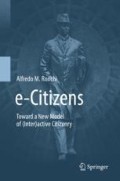Abstract
Technology is evolving toward a mature “calm” phase, “users” are overlapping more and more with “citizens” and they consider technology and e-Services as an everyday commodity, to buy a ticket, to meet a medical doctor, to access the weather forecast. It is a common understanding that recent generations represent a discontinuity compared with past ones. How do we identify e-Citizens? What can we say about new generations of intelligent devices such as Alexa? The “appification” of society has, as usual, both positive and negative aspects, we will outline the main drawbacks and potential abuse and misuse of information means.
ICT as a driver of change; social media and mobile devices. The evolution of communication and e-Citizens: The “Mobile” generation. The re-shaping the market: the power of platforms. Social media opportunities and threats.
Access this chapter
Tax calculation will be finalised at checkout
Purchases are for personal use only
Preview
Unable to display preview. Download preview PDF.
References
Hauben M, Hauben R (1997) Netizens: on the history and impact of Usenet and the Internet. IEEE Computer Society. ISBN:0-8186-7706-6
Europe’s Digital Competitiveness Report, Brussels (2009)
Europe’s Digital Competitiveness Report, Brussels, 17.5.2010 SEC (2010) 627
European Commission (2013) European competitiveness report 2013 – towards knowledge-driven reindustrialisation. Publications Office of the European Union, Luxembourg
European competitiveness report 2014: helping firms grow. Publications Office of the European Union, Luxembourg
Ronchi Alfredo M, The fourth screen, proceedings Global Forum 2010
Weiser Mark D, The computer for the 21st century, Scientific American Ubicomp Paper after Sci Am editing, 09-91SCI AMER WEISER
McLuhan M (1962) The Gutenberg galaxy: the making of typographic man. University of Toronto Press. ISBN:978-0-8020-6041-9
McLuhan M (1964) Understanding media: the extension of man. McGraw Hill. ISBN:81-14-67535-7
Moritz E (1990) Memetic science: I. General introduction. J Ideas 1:1–23
Moritz E (1995) Metasystems, memes and cybernetic immortality. In: Heylighen F, Joslyn C, Turchin V (eds) The quantum of evolution: toward a theory of metasystem transitions. Gordon and Breach, New York (J Gen Evolut Spec Issue World Futures 45:155–171)
Council of Europe (2001) New information technologies and the young. Council of Europe Publishing, Paris
Jones C, Shao B (2011) The net generation and digital natives: implications for higher education. Higher Education Academy, York
Norman DA (1988) The psychology of everyday things. Basic Books, New York
Norman DA (1994) Things that make us smart: defending human attributes in the age of the machine. Addison Wesley, Reading, MA. ISBN:0-201-58129-9
Norman DA (1998) The design of everyday things. Basic Books, New York. ISBN:978-0-262-64037-4
Norman DA (2007) The design of future things. Basic Books, New York
Surowiecki J (2004) The Wisdom of crowds: why the many are smarter than the few. Doubleday, Anchor. ISBN:978-0-385-50386-0
Anderson C (2012) Makers the new industrial revolution. The Random House Group Limited. ISBN:9781847940650
Dawkins R (1976) The selfish gene. Oxford University Press, New York
Pimienta D (2014) Redefining digital divide around information. Literacy and linguistic diversity in a future context of access provision, internet and socio cultural transformations in information society. Interregional Library Cooperation Centre, Moscow. ISBN:978-5-91515-061-3
Prado D (2014) Towards a multilingual cyberspace, internet and socio-cultural transformations in information society. Interregional Library Cooperation Centre, Moscow. ISBN:978-5-91515-061-3
Bohn RE, Short JE (2009) How much information? 2009, Global Information Industry Center. University of California, San Diego
Negroponte N (2002) Being wireless. Wired, October 2002
Prensky M (2001) Digital natives, digital immigrants. On the Horizon (NCB University Press, vol 9(5), October 2001)
Prensky M (2001) Digital natives, digital immigrants, part II: do they really think differently? On the Horizon (NCB University Press, vol 6, December 2001)
The partnership for 21st century skills. http://www.p21.org/, last accessed January 2019
Digital Natives with a Cause? Thinkathon (2010) The Hague Museum for Communication available on line at https://web.archive.org/web/20110124041941/http://cis-india.org/research/position-paper, last accessed January 2019
OECD (2008) New millennium learners: initial findings on the effects of digital technologies on school-age learners, Paris
Author information
Authors and Affiliations
Rights and permissions
Copyright information
© 2019 Springer Nature Switzerland AG
About this chapter
Cite this chapter
Ronchi, A.M. (2019). Netizens, Communities, e-Citizens Being Human in the Digital Age. In: e-Citizens. Springer, Cham. https://doi.org/10.1007/978-3-030-00746-1_2
Download citation
DOI: https://doi.org/10.1007/978-3-030-00746-1_2
Published:
Publisher Name: Springer, Cham
Print ISBN: 978-3-030-00745-4
Online ISBN: 978-3-030-00746-1
eBook Packages: Computer ScienceComputer Science (R0)

